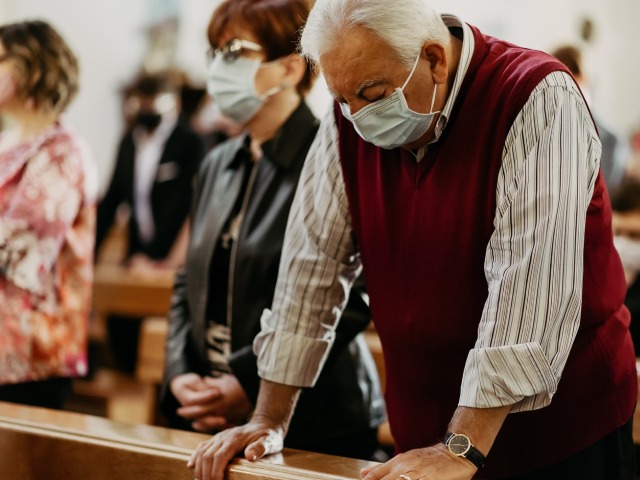Kingdom in the making: diaconal food aid as prefigurative politics
| Date: | 14 April 2022 |
| Author: | Kirsten van der Ham, Thijs Tromp & Peter-Ben Smit |

During the first wave of the Covid-19 crisis, churches in Amsterdam Southeast joined forces to offer food aid. They delivered meals and food boxes to people who, due to the Covid measures, were unable take care of their own meals. It soon became clear that Covid was not the only reason for their need for food. The special ecumenical and diaconal collaboration that emerged between the Treasure International Ministries, the Maranatha Community Transformation Centre and the Evangelical Lutheran Church in Amsterdam, and which was supported by a number of community partners, sheds light on the societal meaning of churches. Research, published in Religie & Samenleving, showed how this meaning related to the churches’ contribution to social cohesion, meaning-making – doing something purposeful, gives purpose – and the development of resilience and the empowerment of those involved. This goes for those who received food aid as well as the volunteers and the professionals, all of whom with diverse religious and ethnic backgrounds.
This blog goes beyond the research published in Religie & Samenleving and argues that a fourth dimension can be distinguished: the dimension of prefiguration. The political-philosophical concept of ‘prefigurative politics’ entails that the practice of a movement or organization, which focuses on a specific desired future, is already experimenting with this future in the present. The desired future thus already exists in the present and the end not only justifies the means, but exists within the means to achieve it. That is to say: the goal already takes shape in the practices of a community. Although religious communities are rarely interpreted through a prefigurative perspective, it is important that they deliver a political statement by being themselves, but without explicitly expressing themselves as political. In our opinion, this certainly goes for the religiously inspired meal project in Amsterdam Southeast .
Through a specific engagement with oneself and with others, the practice of food aid is revealing a glimpse of the world that the participants desire and work towards, even if it is a drop in the ocean. Two quotes, which also appear in the article in Religie & Samenleving, offer a good starting point for a prefigurative interpretation of this type of food aid.
The first quote goes: “Anyone who enters here, is seen as someone who can contribute something and as someone who might need help.” The salient point is the word “here”: it indicates that the location where a project is taking place is different from other locations. This location, here, small and confined as it may be, can be seen as a space of encounter that offers a new perspective on humanity, which would be beneficial for the whole society. Namely, that people may be welcomed as a gift, as having something to offer. What is now only “here”, might one day be “everywhere”: in the practice of the “present”, the “future” is already tangible.
The second citation is: “We do this out of a message of universal kindness. Everyone deserves that regardless of religion, race etc. Your background doesn’t matter. We give food to all.” Here, another perspective on humanity is key: every human being matters. Everyone is offered “kindness” in the form of food. The prefigurative tension can be found in the emphasized “we” and the connotation of “everyone deserves”: although everyone deserves kindness, it is implied that not all receive it. This is different in the practice of food aid. The kind of society that is envisioned in this quote is already present in the practices of the so called “we”. In the means to achieve an inclusive society, namely the food project, this inclusive society is already present.
This ecumenical diaconal meal project thus makes a fourth contribution, in addition to bringing about material social cohesion, meaning-making and empowerment. It offers a prefiguration of a future world, desired by all participants, each from their own point of view. This dimension is irrevocably political – or to phrase it more theological: prophetic. What is deemed “normal” in the present, a world where people do not count equally and are not all treated with kindness, is questioned through in this alternative practice. Seen in this way, a diaconal project always includes an element of protest against the current world and a desire for the world to come - what is described in the Christian tradition as the kingdom of God. A diaconal project embodies the socially valuable ‘utopic potential’ (Charles Taylor). This is what religious communities can contribute to society.
Are you interested in the full article by Kirsten van der Ham, Marjolein Hekman, Mirella Klomp, Peter-Ben Smit and Thijs Tromp, in Dutch? It is available open access in the journal Religie & Samenleving (Religion & Society): Ham, K. van der, Hekman, M., Klomp, M., Smit, P-B & Tromp, T. (2021). ‘Religieus gemotiveerde voedselhulp in de context van de Covid-19 pandemie: gemeenschap, zingeving en empowerment,’ Religie en Samenleving. 16 (2) 158-175.
The research on which this article is based has also been published as a research report: Kirsten van der Ham, Marjolein Hekman, Mirella Klomp, Peter-Ben Smit & Thijs Tromp, Food in Times of Crisis. A Practical Theological Study on Emergency Relief Provided by Churches in Amsterdam Zuidoost during the Covid-19 Pandemic (Amsterdam: PThU, 2021).
About the author
Kirsten van der Ham - PhD researcher in the field of Practical Theology at the Protestantse Theologische Universiteit
Thijs Tromp - Professor at the Protestantse Theologische Universiteit
Peter-Ben Smit - Professor at the Faculty of Theology, Vrije Universiteit Amsterdam and Dom Helder Câmara Chair in Contextual Biblical Interpretation.

